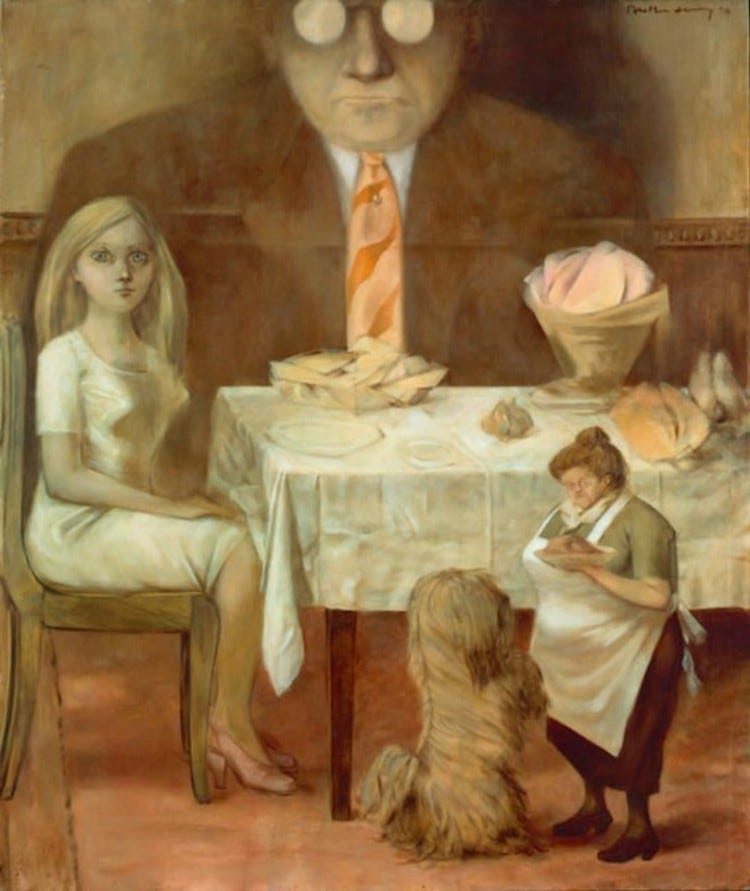Workshop: What stories did you tell in order to survive?
Which old narratives still serve you, and which are holding you back?
Portrait of family (1953-54) by Dorothea Tanning
Today I’d like to experiment with a new format that’s slightly more collaborative: I ask a series of questions and you answer them in the comments. Then on Thursday, I’ll post a follow-up discussion with highlights from the comments section. Here we go!
What stories did you tell yourself in order to survive your childhood? Which of these stories kept reappearing as you grew up and faced the challenges of taxing jobs, difficult friendships, or imperfect romantic relationships?
Do your oldest stories draw you closer to others, or do they keep you comfortably distant? Do they make you feel more confident and open to the world, or do they send you into your bunker with a stack of canned rations and a pile of hand grenades?
Do your stories bring you comfort when you feel rejected? Do they make you feel more capable and more resilient? How do your stories soothe or bolster you when everything is falling apart?
***
Here are some of my old stories, to get you started thinking about yours:
“I’m too fucked up for anyone to tolerate me for very long.”
“I can handle any task on my own. When other people get involved, everything becomes frustrating and difficult.”
“No one sees me clearly or cares enough to truly understand me. No one loves me enough. Other people will always let me down.”
***
Sometimes the most outdated, isolating stories have benefits and drawbacks in equal measure, ways of keeping us focused and productive yet isolating us from others, or allowing us to feel vulnerable and connected yet unable to focus on our big-picture goals.
By writing these stories down and examining them, you can see how pervasive they are in forming your daily experience. You might think “No one truly cares” is a story that’s limited to your romantic life, but then you’ll discover that it’s warping the way you navigate the workplace or how you handle your closest friendships.
Whatever your challenges are, chances are that some of your coping strategies and defenses are tangled up with ancient stories that no longer serve you. Your stories might need to be updated in order to function better in your life today.
My hope is that by sharing some of our stories here, we can recognize how similar many of them are to each other, and also break apart which elements of these narratives are useful to us and which elements block us from feeling fully alive.
If this goes well, maybe we’ll try to do it semi-regularly. If it bombs, maybe I’ll back away and pretend it never happened — see also, one of my oldest stories: “If you fail, wipe it from your conscious mind. That way, your shame will increase exponentially and you’ll never learn a thing!” Tell me your most detrimental or helpful lifelong stories in the comments below.


Thank you for this -- it's a really great reminder that one never heals from a wound by focusing on the agent that caused it, but on tending the injury itself, i.e. if somebody stabs you, tending to the knife will never stop the bleeding. I've been working on letting go of old stories.
I believed in a "carrot man" who stood outside my window. The childhood fears of the carrot man and ghosts were recurring nightmares for decades. I've never felt safe. But as an adult in therapy, I realized he was real and that I hid in the bathroom to protect myself because it was the only room without windows and my parents weren't going to protect me. Now that I have cancer and a death-and-dying therapist, who has helped untangle ALL of it, I'm learning to admire the resilience and survival skills I had as a child. The "stories" don't stand up, but I found a way to fight what I didn't understand, and I need that will to live and fight